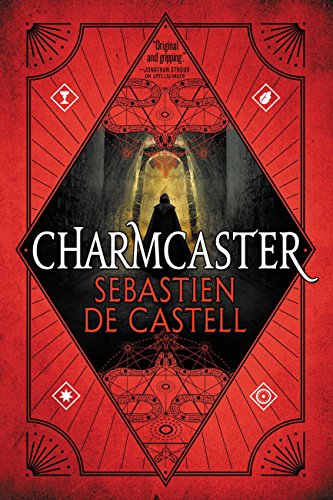
![]() Charmcaster by Sebastien de Castell
Charmcaster by Sebastien de Castell
“But when an Argosi encounters something new — something that should not exist and yet could alter the course of history — we are compelled to paint a new card: a discordance.”
Charmcaster (2018) is the third book in Sebastien de Castell’s SPELLSLINGER series. In it, we see another nation in Kellen’s world, a different form of magic adopts Kellen, and the political situation convolutes in even more dangerous ways. Ferius, Kellen and Reichis team up with some new allies and manage to make still more enemies. Kellen, an exiled Jan’Tep scion who has rebelled against his ruthless, manipulative and politically astute father Ke’heops, still manages to unintentionally aid his father’s interests.
To provide a synopsis of Charmcaster’s plot I may spoil a couple of things for the first and second books.
In Book Two, Shadowblack, Kellen uncovered a vast conspiracy that involved infecting children of prominent families with obsidian worms. The worms allow wizards to control the minds of the young people remotely. For the past several months, Kellen and Ferius have been tracking down the infected youth, and Kellen has been freeing them from the worms’ control. On their way to the trade capital of Gitabria, our group meets a quartet of Berbesq soldiers who are intent on killing another traveler. Ferius and Kellen intervene and rescue the traveler. To Kellen’s shock, it’s Nephenia, the girl he loved back home. Nephenia is no longer the cute, shallow girl who betrayed him back home. She and her familiar, a hyena, join forces with Kellen and the five of them set off to Gitabria.

Sebastien de Castell
Gitabria is a nation of inventors and every year it has an international trade show. Janucha, one of its most powerful “contraptioneers,” has brought to life a mechanical bird. It is not powered by batteries or wound with a key; it seems as if Janucha has discovered a way to imbue a mechanical construct with life force. Ferius immediately sees the danger in this. While Ferius and Kellen are debating the implications of this invention, Janucha’s daughter Cressia tries to assassinate her. Cressia is infected with the obsidian worm; but when Kellen tries to heal her, the wizards threaten to kill her unless Janucha destroys her invention, her notes, and herself.
While Charmcaster continues with Kellen’s bantering first-person point of view and a solid YA structure, with this book the series increases the level of moral ambiguity. Most of it is personal as Kellen, once again, has to decide what kind of a person he is. His first idea is simple: track the wizards magically and kill them, thus recovering the bracelet that controls the worms. This plan is complicated by the fact that once again Kellen’s family, specifically his mage sister Shalla, is involved in the plot. Kellen struggles with family loyalty and the notion of patriotism, which drives one faction of Gitabrians as well. On top of all that, the shadowblack, a demonic force Kellen’s grandmother gave to him, has awakened and seeks to control his mind.
While Kellen battles the shadowblack, his family, his doubts, a masked wizard in scarlet and the Gitabrian secret police, he learns castradazi, or coin magic, and gets hold of a cache of magical coins. He learns more about the cards the Argosi paint and exchange. He begins to understand the importance of the cards called Discordances.
I understood now that what the card really signaled was that all of us — maybe the whole continent — were being driven by fear and uncertainly down a road that led into darkness. For all the talk of exploration and invention, the fact that Gitabria afforded its secret police so much power meant that nation itself was far less secure that it pretended.
Ultimately, Kellen is able to keep some people alive, but the book ends with the fellowship separated and Kellen more ridden with doubt than ever.
Charmcaster seems to have more visual descriptions than the earlier books, particularly of the trade exhibition and a scene out in the hills later. It may be simply that de Castell is showing us more locations, but descriptions of the travelers inn, the various workshops and the amphitheater in which the exhibition is held brought freshness to the story. As with all these books, the plot is convoluted and at times a bit hard to follow, but it’s always enjoyable to watch Kellen puzzle it out. As always, Reichis is as savage and irreverent as ever, still expressing his appetite for human eyeballs, and still coming to Kellen’s rescue when it’s needed. The addition of Nephenia’s familiar Ishak is a great touch.
The SPELLSLINGER series continues to entertain, and it’s clearer than ever that there is someone or something backstage, still pulling the strings. I liked it, and I’m looking forward to reading Soulbinder, the fourth book of the proposed six.



It would give me very great pleasure to personally destroy every single copy of those first two J. J. Abrams…
Agree! And a perfect ending, too.
I may be embarrassing myself by repeating something I already posted here, but Thomas Pynchon has a new novel scheduled…
[…] Tales (Fantasy Literature): John Martin Leahy was born in Washington State in 1886 and, during his five-year career as…
so you're saying I should read it? :)